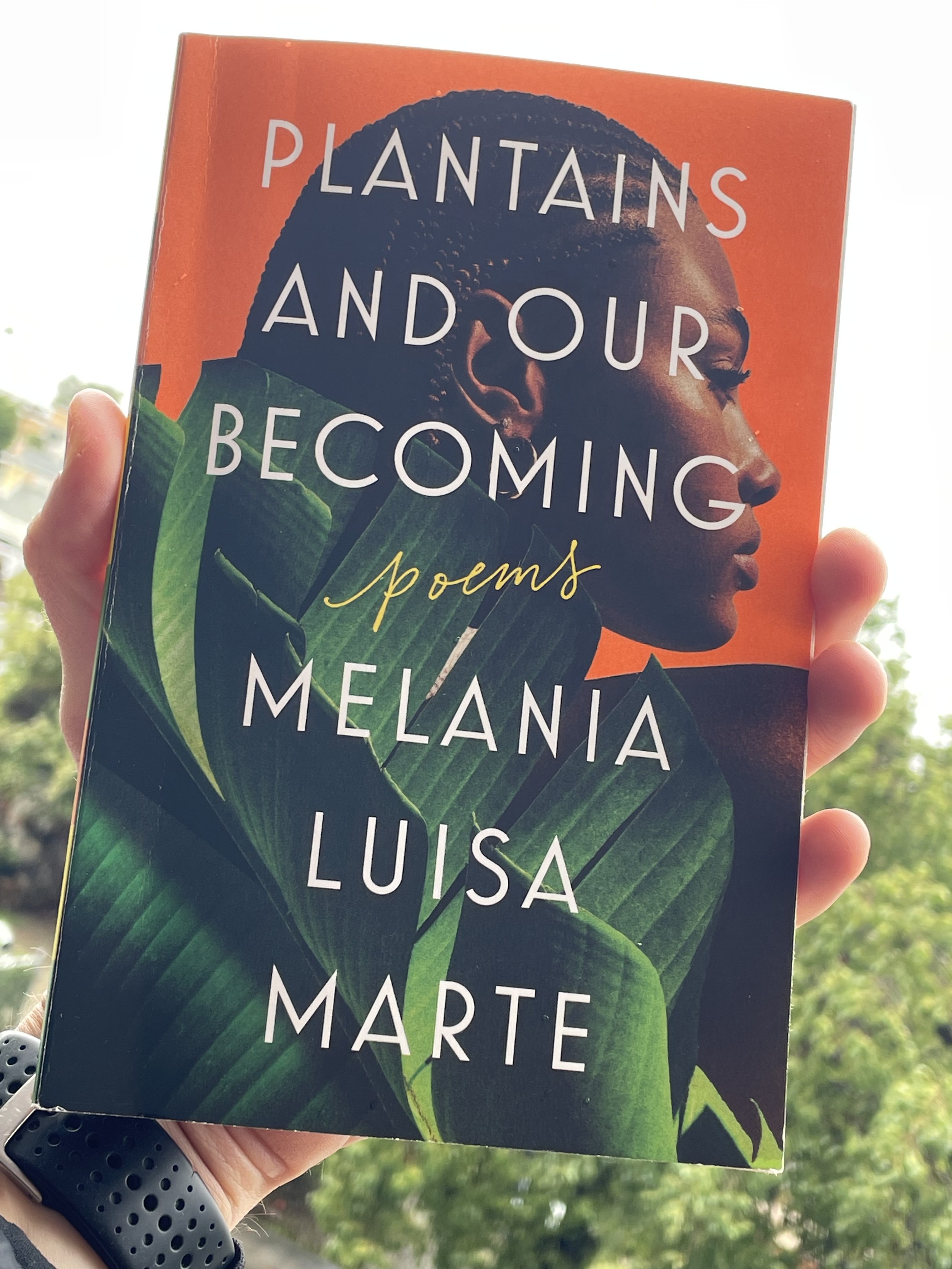"Plantains and Our Becoming" by Melania Luisa Marte

For anyone paying attention less than two full months into 2024, what can we call our world but kaleidoscopic and heartbreaking, hopeful and exhausting, consistently abhorrent and still, insistingly, bafflingly beautiful?
Melania Luisa Marte’s second poetry collection, Plantains and Our Becoming, published in 2023, is definitely paying attention, knows the score and the game board, and sinks readers into a valuable narrative as inventive as it is sharp, her poems bearing artistry in the hands of a witness with all of her claws out, carving much from the raw material she stares down in herself and history and the state of the ever-evolving culture, country, and larger world around her.
Plenty have said a lot about what comes from so-called Instagram poets, a forum where Marte first gained widespread attention, a blanket terms which smacks of the same lazy assumptions that have come for poets since the form began, from prehistory to slam to any number of other movements since rhythm was first put to language.
Given that the exceptional are going to present a small portion of any school, aesthetic, era, sport, etc., the type of power Marte brings with Plantains traverses a rich variety of terrain to courageous and original effect, from meditations on personal trauma to grappling with history at large, leading tours of social dynamics fraught with racial tensions, and always with full attention, daring herself and the reader to be scared, to be heartened, to listen and be “anything but complicit or numb.”
The groundwork of Marte’s story is set early, witnessing and bearing abuses on a variety of fronts, and still seeing a seed of a voice that has no choice but to create, as she says in “Telling Time,” writing was a purpose found early and nourished, a center seized at 15 when she:
“want(s) to die but instead I write. Time follows me.”
The turn is essential, since for her and many others, to tell one’s own story is to put hands on its parameters, to gain control when much is in free fall, to dilate or sharpen the walls of a bowl containing a life on a wheel the artist spins at their discretion.
From here, Marte’s visions expands.
She is clear-eyed about the “ridiculous and enticing” nature of America’s veneer, naming the unmet needs of so many within its borders while, on the surface, zeroing in on a familial home she must escape, but could just as well be speaking on the United States:
“Looking back will hurt. It will hurt more than staying,” she says of a place she leaves for a new home, a place “where the stomach is safe, loved/Unafraid that the next meal will come.”
Years pass, and with them come proven-out anxieties around being pulled over by the police, severely lopsided guest lists at parties, micro aggressions, macro aggressions, environmental degradation, Marte swinging swords on them all in bouts like “On Voting” and “Name Poem,” delivered in strikes that land hard, harder, and openly experiment with form in ways that only elevate the effort, pulling off a haymaker of syntax play in “White Parties,” where we have slashes to denote line breaks, but are set in a single-spaced block, a condensed anvil of a text sparking off the friction of frantic strain and defensive frenzies, personalities and tempers whirling and slicing at each other at a social function that, of course, burns the figurative house down.
Structure is opened to tremendous effect again in “The Haitian & Dominican Flag Exchange Words,” a gutting of history as emotional as it is political as it is insistent on being read up, down, across, then each way again, and yet again to find more on each approach, putting a megaphone on the moniker of “Mal Habla” Marte’s mother gave her, and fits well: she’s pissed, for good reason, cursing and naming conquistadors of the old and the current centuries alike across the collection, at turns seeing “the most vulnerable are the most targeted,” detailing how “an increase in war probability tends to decrease stock prices but the ultimate outbreak of war increases them,” a report that invites the image of trembling investors murmuring under news feeds, “We’ve done it now, this might break the system,” only to say the following day, with relief, “Well, we’re still standing, so we’re on the right side: the lucrative one.”
Marte isn’t under any illusions, and might or might not be seeing socialist solutions, “I want a math problem that will teach me to make enough to save us all,” which could be read as exasperation, or a point for redistribution of wealth, asking for more value than scoreboard of the monetary core that has fed and keeps feeding the capitalist ouroboros.
Whatever the conclusion, Marte’s work speaks to an artist’s approach to life full of promise and a pursuit of truth she cannot get enough of. It rewards her, and the reader, by way of a channel for how her “love still finds a way to pour” and finds reason to look forward, to aspire for more, as in “Climacteric Wonders,” declaring that, and one hopes, “we don’t have to die to make it home. all of us.”
